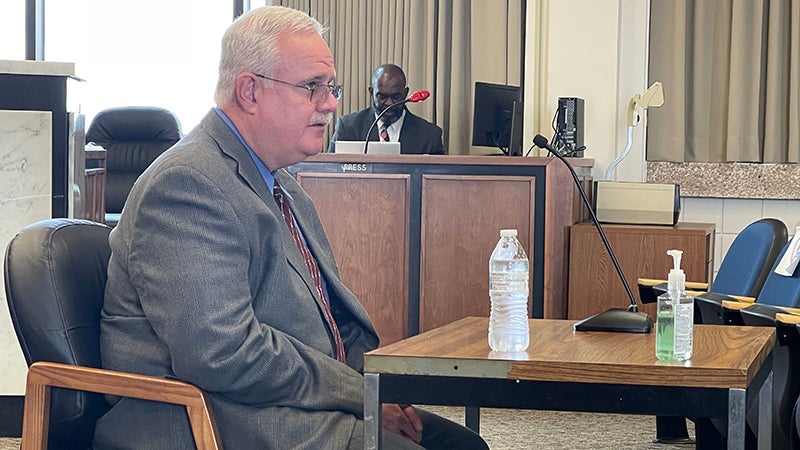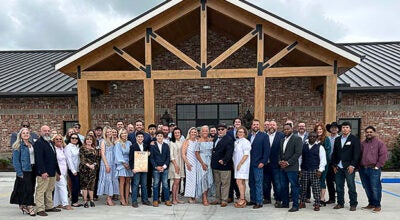Protecting the elderly, disabled from scams
Published 2:18 pm Friday, December 8, 2017
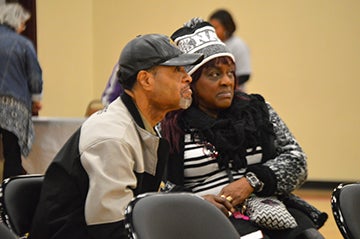
- Larry Wayne Baise, left, and Troylynn Cador listen to a speaker during a presentation regarding financial exploitation hosted by Adult Protective Services on Thursday at Port Arthur recreation Center’s Amos Evans Building. Mary Meaux/The News
Laura Welch is drawn to an inspirational verse printed on a small poster that features of an elderly man; “As you see yourself, I once saw myself; as you see me now, you will be seen.”
Welch, community engagement specialist with Adult Protective Services, works with others to protect vulnerable adults from abuse, neglect and financial exploitation. On Thursday she gathered with others to discuss financial exploitation and how to protect yourself and loved ones. The event was held at the Amos Evens building at the Port Arthur Recreation Center.
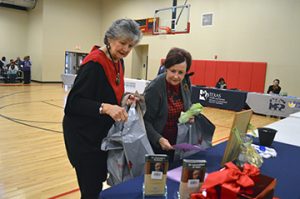
Mary Watson, left, and Violet Arena, both of Beaumont, pick of brochures about financial exploitation during an event hosted by Adult Protective Services on Thursday at Port Arthur recreation Center’s Amos Evans Building.
Mary Meaux/The News
She told of an 85-year-old woman she had met whose home was damaged with the flooding from Tropical Storm Harvey. The woman had spent $10,000 for a contractor who came in, gutted her home and put up sheetrock before taking off. A second contractor came in and noted that the first group had did the work while the walls were wet, causing the women to have to spend even more money for repairs.
“Since Harvey, the number of cases (seen by APS) have increased by approximately 100 more cases per month,” she said. When you beak that down, each worker saw an additional eight more cases, more intakes. That’s 14 workers with an increase of eight.”
Each worker has about 15 to 20 cases in addition to the new ones.
Capt. Jeff Chadney with the Jefferson County Sheriff’s Office informed the group of about a dozen or so about scams. He used humor, wit and straightforward speech during his talk.
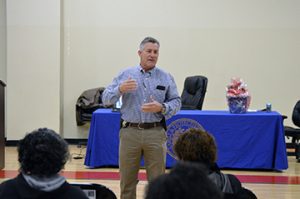
Capt. Jeff Chadney with the Jefferson County Sheriff’s Office provided information about scams and how not to be a victim during an event hosted by Adult Protective Services on Thursday at Port Arthur recreation Center’s Amos Evans Building.
Mary Meaux/The News
“The IRS does not call you on the phone. They send a nice little letter,” Chadney said with a laugh. “The lottery will not call you on the phone and offer you money and you have to pay $100. Your grandson or granddaughter did not go to jail in New Mexico and need help. The military service adjunct general will not call you about your grandchild being court marshaled. If you ar ei front of your computer and someone calls and says your computer has a virus, they are not in your computer.”
He also advised not to give out personal information. The bank will not call and ask for your social security number- this is something they should already have.
Welch explained that many times a financial abuser is a family member, they can alos be caregivers, paid or volunteer, strangers or may have met in public or those who come into your home or professionals hired by the victim such as accountants or lawyers.
According to APS, examples of financial exploitation include: cashing checks without authorization, forging a person’s signature, misusing or stealing a person’s money or possessions, coercing or deceiving a person into signing documents such as a contract or a will or the improper use of conservatorship, guardianship or power of attorney.
To protect yourself from becoming a victim of financial exploitation: don’t sign blank checks allowing another person to fill in the amount, don’t leave money or valuables in plain view, be aware of scams either by phone or through the mail. If it sounds too good to be true, it probably is.
Other tips include: don’t give strangers access to your bank accounts, check your financial statements frequently and carefully for unauthorized withdrawals, don’t sign any document you have not completely read or fuly understand and don’t be pressured by family members, friends, caregivers or anyone to do anything you don’t want to do.
For more information on abuse, neglect and exploitation of people who are elderly or who have disabilities visit www.everyonesbusiness.org or call 1-800-252-5400.



